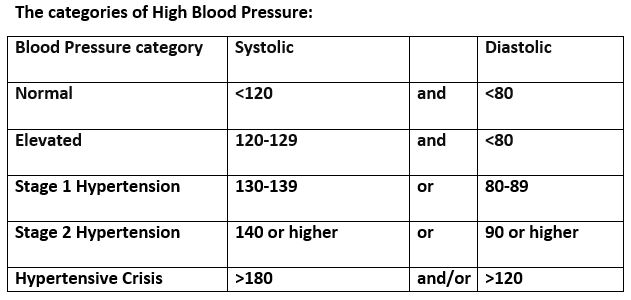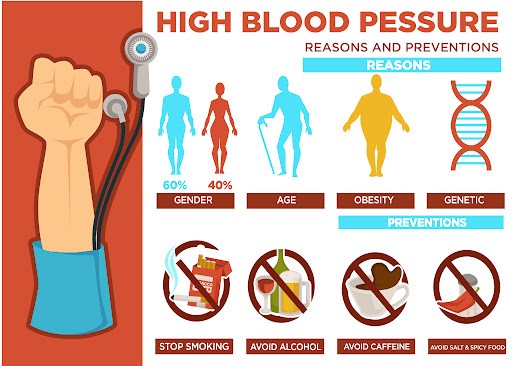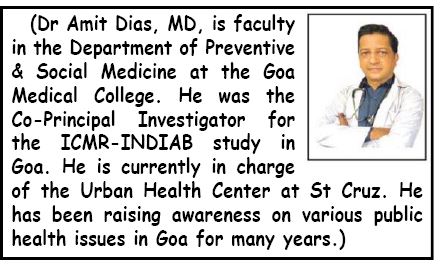World Hypertension Day
An interview with Dr Amit Dias
May 17 is observed as World Hypertension Day. Dr Amit Dias throws some light on the subject of hypertension and its implications, he says, “We need to pay more attention to hypertension and fight this silent killer.” And warns, “The pressure is on each and every one of us to control high blood pressure.” Please do not take hypertension with a pinch of salt, take it seriously to stay fit….
Goan Observer: Greetings on World Hypertension Day, doctor. Let’s start by understanding if there a need to get stressed about hypertension?
Dr Amit Dias: Yes, very much…. I would say, we need to pay more attention to hypertension. Hypertension does not just result in a rise in the blood pressure – it can lead to premature death. Very often, people do not know that they have hypertension till they get some complication. That’s why it is often described as a “silent killer.”
Hypertension is a leading risk factor for early deaths and is responsible for over 10 million preventable deaths every year. There are an estimated 1.28 billion people with hypertension in the age group of 30 – 79 years and what is worse is, as I stressed earlier, almost 50 % of them do not know that they have this condition. Less than half the adults (42%) with hypertension are diagnosed and treated.
Q: That is very alarming, what exactly is hypertension?
A: Hypertension is more commonly known as high blood pressure. Blood pressure is the force that moves the blood through the circulatory system and is essential. However, when the pressure crosses the normal limit it can cause harm and even premature death — it needs to be detected and kept under control. It’s like a balloon — which has more pressure if you blow more air and can ultimately burst. But we need not worry for hypertension can be screened, detected early and controlled.
Q. How often do we need to screen for hypertension and at what age?
A: In apparently normal individuals, those in the age group of 18-39 should screen themselves at least once in 3-5 years, while those above the age of 40 should do it annually. We encourage opportunistic screening, every time you go to see your doctor, get your blood pressure checked. At the Urban health Center in St Cruz, which is currently under my care, we send every patient to a NCD screening clinic before they are seen by the doctor and it works very well. They get their blood pressure, body mass index and blood sugar checked. We need to get innovative in addressing the problem of hypertension in our country.
The problem is huge and it is an easy risk factor to screen and treat. The impact achieved by early detection and immediate treatment can be significant. Hypertension is responsible for almost 60% of stroke deaths and 25% of the deaths due to heart ailments. Studies have revealed that almost 20-30 % of the Indian adult population have hypertension and the numbers are rising. We recently completed the ICMR- INDIAB study in Goa and found hypertension was on the rise in the adult population.
Q: We often hear systolic and diastolic blood pressure, can you simplify these terms?
A: Yes, blood pressure is measured as systolic (the higher number) and diastolic (lower number) pressure. Systolic pressure is the force of the blood against the walls of the artery as the heart contracts, whereas diastolic pressure indicates the blood pressure when the heart relaxes or between the heartbeats. The readings are measured in mm of mercury and are written, for example as 130/84- where 130 is the systolic pressure and 84 is the diastolic pressure.
Q: At what level would you say that a person has high blood pressure?
A: Blood pressure cut-offs have kept changing over the years based on the evidence. The consensus is to aim for a normal blood pressure of 120/80 and keep the blood pressure lower than 140/90 mm of mercury.
However, the newer guidelines would label those with a systolic above 130-139 and a diastolic of 80-89 as Stage 1 Hypertension and those with a BP > 140 (systolic) and > 90 diastolic as Stage 2 hypertension.

Q. What are the health problems associated with high blood pressure?
A: Long standing elevated blood pressure leads to a process called atherosclerosis; wherein there is a build-up of fatty material or plaques inside blood vessels, narrowing them and thus further increasing the blood pressure. If a blood vessel blocks up totally it leads to a heart attack.
Besides heart disease, high blood pressure can also cause kidney disease. Kidney disease in turn can further raise the blood pressure as the electrolytes, including sodium, are not adequately excreted from the body. One can get a stroke, which is a block or rupture of a vessel in the brain, leading to paralysis. It can damage the eye just as diabetes causes damage to the small blood vessels and leads to retinopathy. There are several complications of raised blood pressure including Alzheimer’s disease and death.
High blood pressure can damage the blood vessels or in some cases the blood vessel may burst and the person may have a stroke depending on where the damage takes place. The goal is to detect blood pressure early, much before the damage is done and control it. Screening, as I mentioned earlier, is most essential.
Q: What about medications that control high blood pressure?
A: There are several medicines available for the treatment of hypertension. You need to consult your doctor. Depending on a detailed evaluation the right medication will be chosen for you. Do not take the medicines that another family member takes, as it may not be best suited for you. Always consult a doctor. Wherever possible, one must try and find the cause of the blood pressure and treat the root cause. Often this is not known and one must take appropriate treatment and adopt healthy lifestyle measures to control hypertension.
The good news is that it can also be prevented by adopting a healthy lifestyle-restricting salt to less than 5 grams per day, diet control, avoiding fatty food and increasing the serving of fruit and vegetables, exercising at least 30 minutes per day, manage stress, lower alcohol intake, stop smoking, weight reduction and regular monitoring are some of the measures for hypertension prevention and control.
Q: Can we prevent hypertension?
A: Yes, we can certainly prevent and control it. Lifestyle modifications play a crucial role in managing hypertension. Regular exercise, maintaining a healthy weight, reducing sodium intake, limiting alcohol consumption, and quitting smoking are all essential for managing blood pressure. Additionally, adopting a balanced diet rich in fruits, vegetables, whole grains, and lean proteins can help prevent and manage hypertension. We advocate what is known as the DASH diet.

Q: Could you elaborate on the DASH diet for our readers?
A: Certainly. The Dietary Approaches to Stop Hypertension (DASH) diet is often recommended for individuals looking to prevent or manage hypertension. It emphasizes fruit, vegetables, whole grain, lean protein and low-fat dairy products while limiting saturated fats, cholesterol and sodium. Foods rich in potassium, magnesium, and fiber such as bananas, leafy greens, nuts, and seeds are particularly beneficial for lowering blood pressure.
Q. That is alarming. What is your final message on World Hypertension Day?
A: Hypertension is a silent killer and one must not take it lightly. Do not take this message lightly as if with a pinch of salt. Hypertension is one of the major public health targets and we are aiming to reduce it by 33% by 2030. Our fight against hypertension starts with everyone realizing that hypertension can occur in anyone and one needs to check one’s BP to find out. The message to everyone is very clear: Measure your blood pressure accurately, control it, live longer. You can keep hypertension under control and live a healthy lifestyle.
Remember to check your blood pressure. A person with high blood pressure may not have any symptoms for years, while it silently causes damage to the system.
Make up your mind to live right, live strong, live long!

